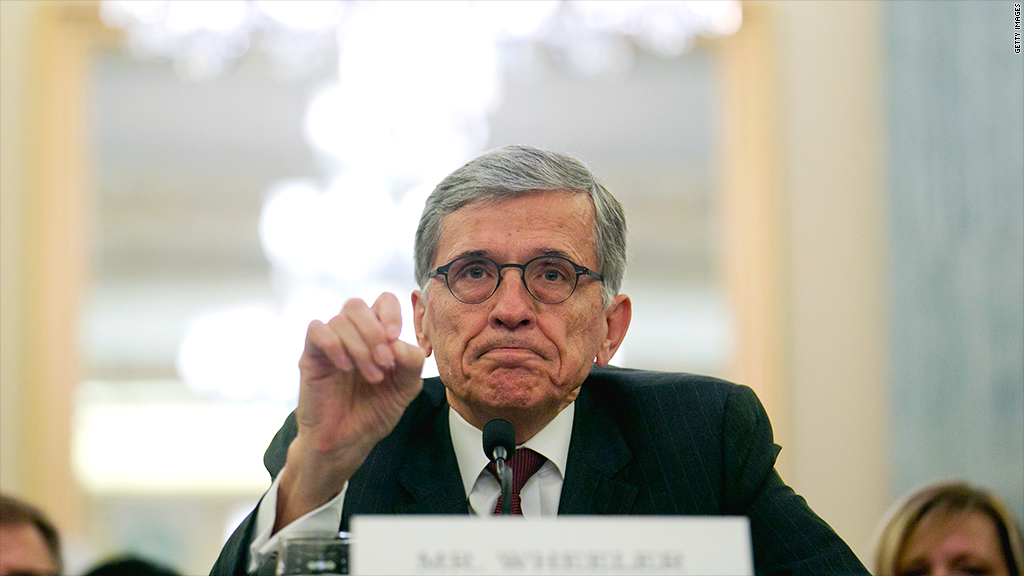
The battle for the open Internet has entered a new phase.
On one side, federal regulators and content providers are trying to preserve competition and keep all websites equally accessible. On the other, Internet service providers want to hold down their costs while keeping up with Americans' ever-increasing demand for digital content.
These goals may be mutually exclusive, and it isn't yet clear which side will emerge victorious.
The Federal Communications Commission faced a big setback on this front in January, when a court struck down its "Open Internet" rules. The FCC had barred ISPs from blocking or "unreasonably discriminating" against Web content, but Verizon (VZ) successfully challenged the regulations on the grounds that the so-called "net neutrality" rules had overstepped the commission's legal authority.
The FCC now faces the challenge of crafting new net neutrality regulations that will withstand legal scrutiny. FCC Chairman Tom Wheeler said last week that the agency plans to do just that.
"Wheeler has stood up and walked through town like the sheriff and said, 'Okay, the rules are still on,'" said Tim Wu, a professor at Columbia Law School who coined the term "net neutrality."

"Whether he's shooting blanks or bullets isn't clear yet, but he's on the beat."
Related: Google Fiber may be coming to a city near you
The FCC is currently collecting public comments before issuing its new set of regulations. Wheeler said those rules would prohibit ISPs from blocking websites, force them to disclose how they manage traffic and prevent them from favoring some kinds of traffic over others -- for example, loading Amazon (AMZN) faster than eBay (EBAY). The agency also wants to enhance competition among ISPs by reversing restrictions on broadband services from local governments.
AT&T (T) and Comcast (CMCSA) have committed to abiding by the 2010 rules despite the January ruling that overturned them. Yet at the same time, they've instituted policies that some argue are against the spirit of net neutrality.
Comcast and Netflix (NFLX) announced an agreement Sunday in which the online video company will boost streaming speeds by paying for direct access to Comcast's broadband network, instead of delivering traffic through third parties as it's done previously.
Related: Customers react to Comcast-TWC deal
Other big tech companies, including Microsoft, (MSFT) Google (GOOG) and Facebook (FB) already have paid-connection deals with big ISPs.
The FCC's pending rules won't address these kinds of deals, which could nonetheless affect the kinds of content consumers can access.
Given the massive amount of data consumption Netflix generates -- around a third of traffic on big ISPs during peak hours -- some analysts say it makes sense for the company to pay up. If ISPs have the option of charging content distributors, that could allow them to bring down costs for consumers and reinvest in infrastructure.
"Right now, I think most people are using the Internet without too many problems," said Rich Greenfield, an analyst with BTIG. "The question becomes whether this is a solution looking for a problem."
But consumer advocates worry that such direct-access agreements favor deep-pocketed content companies over small ones. They have also expressed concern that the FCC's planned rules won't cover the mobile Web, which is much more lightly regulated.
Last month, AT&T announced a "sponsored data" plan for mobile customers in which content from paying businesses won't count against monthly data caps, creating concerns about traffic discrimination. Verizon and AT&T have also previously blocked use of the Google Wallet app, which competes with their own offerings.
Though FCC doesn't have a great track record on net neutrality -- its two previous attempts at regulation having been invalidated by court rulings -- the agency does have a "nuclear option." The FCC could move ISPs into the same legal category as phone companies, which are treated more like utilities and face stricter regulations. The FCC hasn't taken the reclassification option off the table, but isn't pursuing it for the moment. The move would surely meet resistance from the industry's well-funded lobbyists, of which Wheeler was previously one.
Meanwhile, the biggest broadband providers could get even bigger: Comcast recently announced plans to buy Time Warner Cable (TWC) for $45 billion, potentially creating a combined company that would bring cable or Internet service to about 30% of American subscribers.
"When it comes to high-speed Internet access, you have a few massive players with unconstrained market power, and as a country, we're risking our future by not treating Internet access like a utility," said Susan Crawford, a professor at Cardozo Law School. "Instead we're serving the shareholders of the cable companies."

